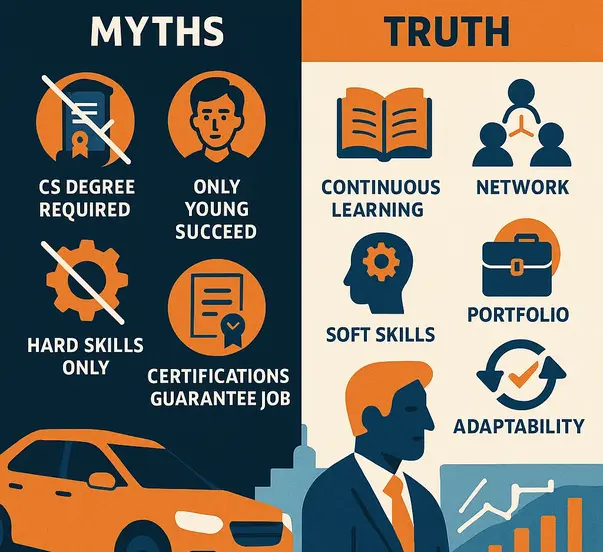Introduction: The Reality Behind Tech Career Myths Debunked
The world of technology is booming, but misinformation and outdated beliefs still hold many people back. In this post, we’ll break down the most persistent tech career myths debunked—from the need for a computer science degree to the idea that only young people can succeed in tech. Whether you’re switching careers, just starting out, or looking to level up, this guide will help you focus on what really matters.
Supercharge Your Tech Team: Post Jobs for Free with WhatJobs and Reach Top Talent!
Hiring? Post your openings today and connect with skilled professionals in AI, cloud, cybersecurity, and more – fast, free, and global.
Post a Job Now →Top Tech Career Myths Debunked
Myth 1: You Need to Learn the Hottest New Programming Language
- According to the Stack Overflow 2023 Developer Survey, the most in-demand languages are the classics: JavaScript (since 1995) and Python (since 1991).
- Companies value maintainable, reliable code over the latest trends.
- RedMonk’s language rankings confirm that the most popular languages have remained stable for a decade.
- Key Point: Focus on foundational languages and skills, not just the latest hype.
Myth 2: You Need a Computer Science Degree
- 65% of developers learned coding and project management through self-study (Stack Overflow).
- HackerRank’s Developer Skills Report found 87% of hiring managers value skills, certifications, and portfolios as much as degrees.
- Employers care more about what you can do than what’s on your diploma.
- Key Point: Build a portfolio and real-world skills—degrees are not the only path.
Myth 3: You Can Become a Pro in Just a Few Months
- Headlines promise “Become a developer in 12 weeks!” but real growth takes time.
- Expect to start with internships or entry-level roles and work your way up.
- Key Point: Set realistic expectations—tech is a marathon, not a sprint.
Myth 4: You Need to Be Great at Math
- Only 25% of tech job postings require advanced math (Glassdoor, 2023).
- Roles like UX design, project management, and data analysis use basic math at most.
- World Economic Forum’s Future of Jobs Report and Google’s Project Oxygen show that problem-solving, critical thinking, and communication are more valuable than technical expertise alone.
- Key Point: Soft skills matter as much as, or more than, hard skills.
Myth 5: Tech Is Only for Young People
- HackerRank found developers over 35 are more likely to be in senior leadership.
- 83% of tech companies report that age-diverse teams are more productive.
- Key Point: Tech welcomes career changers and values experience at any age.
Myth 6: You’ll Spend All Day Coding
- Most tech roles involve collaboration, meetings, and problem-solving—not just coding.
- As you advance, you’ll spend more time on strategy, communication, and leadership.
- Key Point: Tech is a people business as much as a technical one.
Myth 7: You Need to Live in a Major Tech Hub
- Hired.com’s 2023 report shows remote tech jobs have increased by 145% since 2020.
- Many remote workers in smaller cities keep big-city salaries while enjoying a lower cost of living.
- Mid-size and startup companies often pay fairly regardless of location.
- Key Point: You can build a successful tech career from anywhere.
Key Points: What You Need to Know About Tech Career Myths Debunked
- Classic Skills Win: Focus on proven programming languages and foundational skills.
- Portfolio Over Paper: Real-world projects and certifications matter more than degrees.
- Growth Takes Time: Be patient and persistent—success is built over years, not weeks.
- Soft Skills Are Essential: Communication, teamwork, and problem-solving are critical.
- Tech Is for Everyone: Age, background, and location are not barriers.
- Remote Work Is Here to Stay: Opportunities abound outside traditional tech hubs.
How to Build a Successful Tech Career in 2024
For Job Seekers
- Build a portfolio of real projects (GitHub, open source, freelance).
- Network online and offline—join tech communities, attend meetups, and connect on LinkedIn.
- Upskill with online courses, certifications, and bootcamps.
- Use job search platforms like WhatJobs to find remote and local tech opportunities.
For Career Changers
- Leverage your existing skills—project management, communication, and problem-solving are highly valued.
- Don’t be afraid to start small; internships and contract roles can lead to full-time positions.
- Seek out mentors and peer support.
For Businesses
- Hire for potential and soft skills, not just technical expertise.
- Embrace remote and flexible work to attract top talent.
- Foster age and background diversity for stronger teams.




